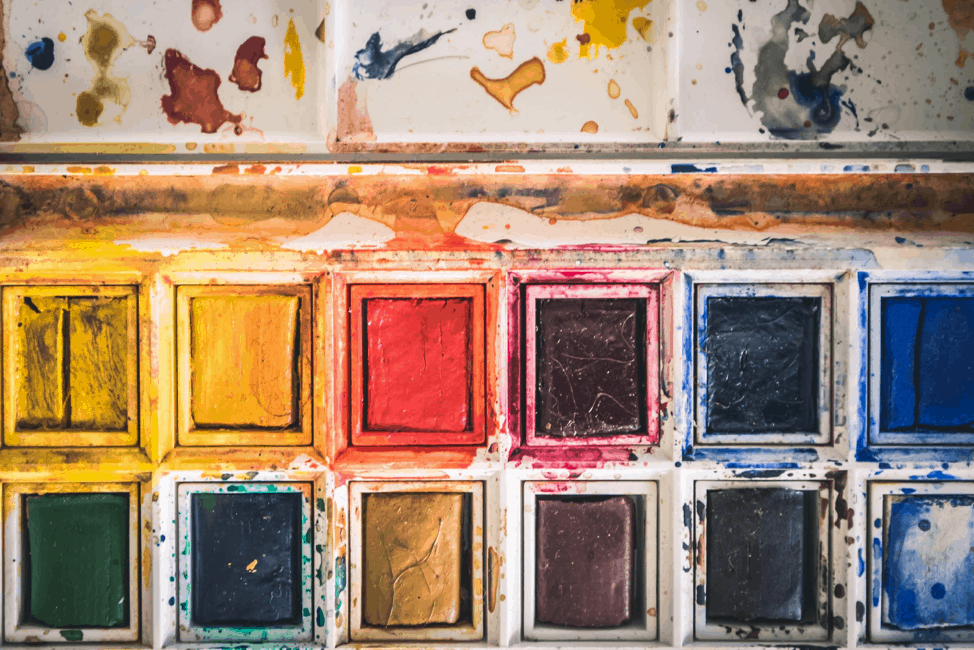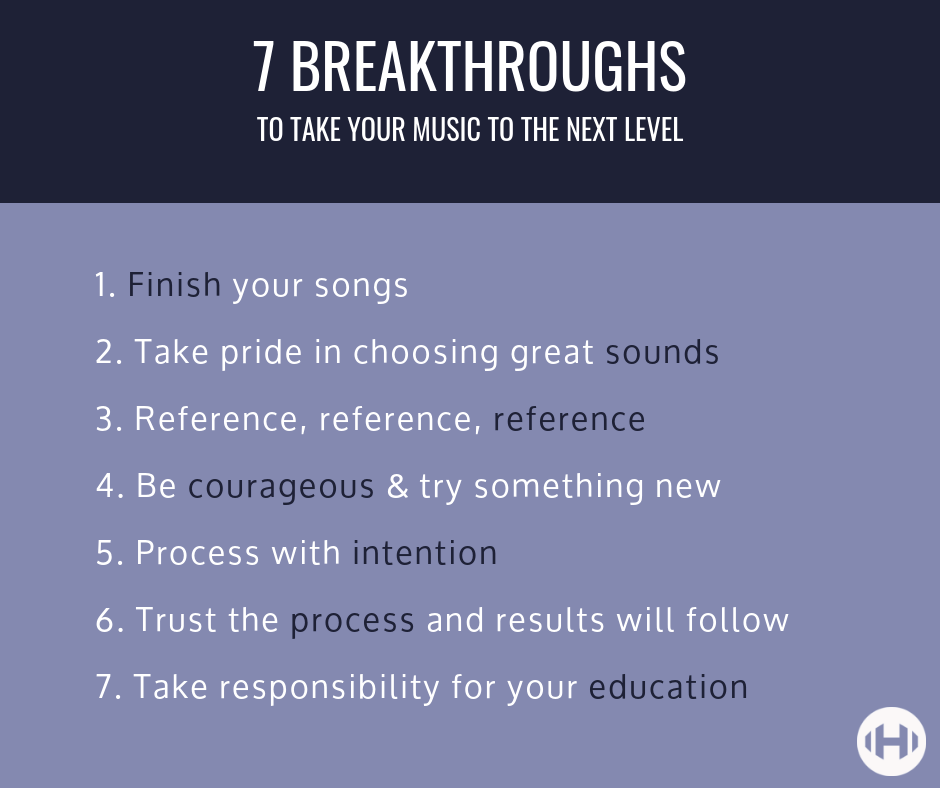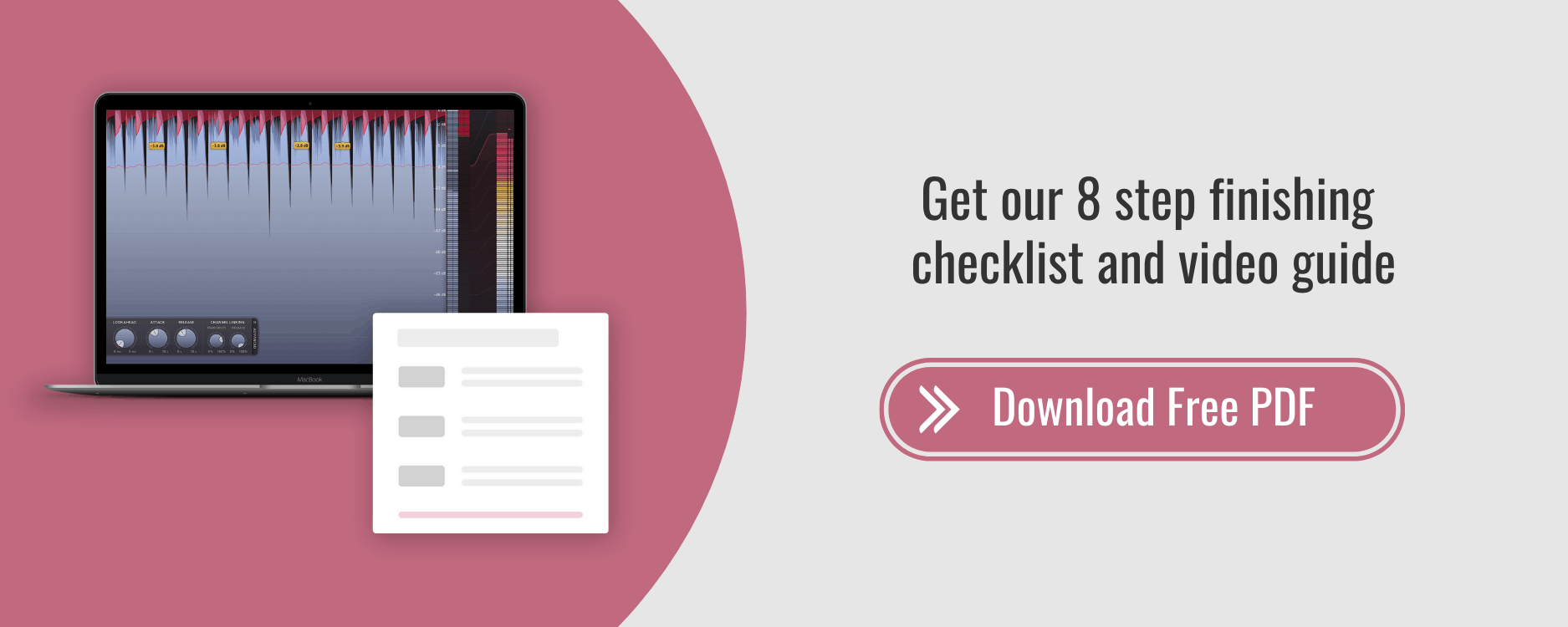The 7 Deadly Mistakes New Music Producers Make
"You don't learn to walk by following rules. You learn by doing, and by falling over."
— Richard Branson (Entrepreneur)
Every time you open your DAW, you are staring down your dream straight in the face.
There’s a reason you listened to that calling. There is unfulfilled potential keeping you up late at night, researching plugins, and devouring production techniques. You want to be good. You want to be better than you are. You want to be one of the greats. Just like those who inspired you to start making music.
Let me share a secret with you: there is no magic finish line between being an amateur and a professional.
Turning Pro is a decision you commit to and reaffirm through your actions over and over again. It’s about approaching your development as a musician with the mindset of consistency and effort.
When you hold yourself to high standards and trust that consistency and effort will lead the way, you are on the path of mastery. Being a professional is committing to the path of little victories every day. And the biggest victory is simply showing up and doing the work you know you need to do.
If you rest on your laurels and dabble without focus or without intention, you are acting like an amateur. If you don’t take your own music seriously enough to focus on getting better, learning the tools, and committing to the process, how do you expect anyone else to take you seriously as a professional?
This article has one goal: create a clearer understanding of how to actually get better at making music.
In my experience, these are the most frequent – and deadly – mistakes made by new producers:
1. Not finishing songs
2. Overlooking the importance of sound choice
3. Refusing to reference
4. Fear of standing out
5. Processing without a purpose
6. Letting results overshadow the process
7. Leaving your education to chance
1. Not Finishing Songs
This may sound harsh, but there’s no other way to put it:
You’re not a music producer if you don’t finish music.
I am intentionally keeping this one short so the importance sinks in.
You must finish the song.
Many new producers have trouble finishing songs. You might be one of them. This is a critical moment in the development of your skills. It’s the tipping point.
If you work through what’s stopping you now, it will be easier next time. If you give up, that only makes it easier to quit next time. You are what you practice, so practice being a finisher.
A finished song has an arrangement over time and uses some form of contrast between sections to create movement. This is your #1 goal. Think about the 80/20 principle, where 80% of the results come from 20% of the possible actions. Finishing music will improve your skills as a producer like nothing else can. Do not allow anything to stand in the way of this goal.
2. Overlooking the Importance of Sound Choice
Consider how important it is for a master painter to choose her palette, canvas, textures, and tools based on the mood she wants to create. As producers, we have the entire frequency spectrum at our fingertips. Sometimes the mature decision is to withhold high energy sounds to create a dark, warm, and intimate space. Other times we’ll want to experiment and try new sounds and production techniques.
Whether you’re experimenting or going for a specific vibe, you must be discerning when choosing the sounds that enter your productions.
I recall a specific example after listening to a student’s track towards the start of a recent Masterclass session. I told him “You may not want to hear this advice, because it’s so simple. But changing the sound of your snare drum to something with real body, weight, and punch will take this song from a 4 to a 7. The sound you chose lacks power, and doesn’t sit right with the rest of the composition.” Turns out he was glad to hear it, and I watched him take the advice to heart.
This is the equivalent of a chef telling culinary students to use the best ingredients. Once you’ve chosen a quality starting point, it’s equally important to make sure the next ingredients you add to complement the dish and work with what’s already there.
Here are the top two actions that will up your sound-choice game right away. First, create a favorites folder, where you save sounds you really like. Second, you must reference (including sampling from) other songs to give your ears a point of reference.

3. Refusing To Reference
I’ve said it before, and I’ll say it again: referencing is something only the pros talk about.
And I'm not going to lie — there is something very hard about becoming religious about referencing. Every time I sit down to make music, referencing is the last thing I want to to do. It's like my diabolical, self-sabotaging artistic mind doesn't want me to reference.
And yet, every time I do, I re-calibrate my ears in all of the stages below.
You can reference other works of music or art at any stage:
1. Reference during pre-production for sound choice, vibe, and arrangement ideas.
2. Reference during composition for structure, arrangement, and rhythm guides. Listen for change.
3. Reference during mixing to achieve a similar balance to a commercial track you admire.
4. Reference during mastering for loudness and commercial polish.
5. Reference during release to understand the strategies your heroes use to share their music.
Referencing with an open mind can only help your music. Next time you’re stuck, open up a song you admire and look for ideas for how to move forward. Referencing during the technical stages of mixing and mastering won’t make your music sound “like everyone else’s.” It will help it sound professional and up to commercial standards.
4. Fear of Standing Out
Humans learn through imitation. It’s our most fundamental way of operating in the world. Before we can read, tie our shoes, or play a chord, we learn by watching someone else and then duplicating their efforts.
I don’t know a single producer who doesn’t aspire to be great. I’ve never talked to anyone who said “You know, I’d rather be just okay at this. Being the best I can really isn’t for me.”
On the contrary, most producers I talk to are so filled with passion and enthusiasm that it’s obvious how deeply they care. And because we care so much about being great, we idolize those who have achieved greatness in their music careers.
Learning from those we admire is absolutely essential to becoming better. But a great danger lies in comparing ourselves to others. For some, it’s fear of putting music out that’s “not good enough.” For others, it’s trying too hard to sound like someone else, leaving no room for their own voice.
This is something I see just about every day, especially from producers early in their career.
Here’s the truth: in this industry, you’re only as good as you are different. It’s your job to create a powerful dynamic between familiarity and freshness. You can’t have one and not the other. That which is too familiar and adheres to every rule in the genre will rarely be differentiated enough to matter.
On the other hand, a track that is completely out of left field has the potential to confuse our brains which long for a point of reference. Still, it’s better to practice taking risks than it is to practice staying within the lines every time.
So take a chance and walk that tightrope. Embrace the idea of sounding like yourself. You can’t afford not too.

5. Processing Without a Purpose
This mistake comes from the same root as poor sound choice: lack of intention.
Why are you compressing that kick drum? Is there a reason for the EQ moves you’re making?
Being intentional about when and how you process sounds will save you time, make your music clearer, and free up precious CPU.
It would take about a month to convey all this information (which is exactly what we do in the Hyperbits Masterclass), but I’ll offer up four of my favorite tips for processing with a purpose:
#1 — Know when to process. In the early stages of an idea, it’s tempting to reach straight for plugins and start loading them onto every track. Not only will this bog down your computer, but it distracts you from the composition at hand and moves you into the analytical side of your brain. Practice restraint and create the song first.
#2 — Use track volume and panning to get things in place, but move quickly and keep your brain in composition mode. Once you have the initial idea and it’s structured out into an arrangement, you can start balancing sounds more precisely with EQ, compression, and saturation.
#3 — Default to using reductive EQ to sculpt your sounds instead of boosting. This requires taking a step back and asking “What can I take away to help the good parts of this sound shine through?”
#4 — Brush up on when and why to use compression. It’s a misunderstood concept, and this blog post will give you a framework for knowing when to compress – and more importantly – when not to compress.
6. Letting Results Overshadow the Process
The path of those we consider great follows a surprisingly similar trajectory:
First, they are called to do something, something only they can do. They care about it so much that they want to put in the time and effort to be the best they can.
Next, they fail at something they wanted to achieve. Without fail, failure is a part of the process. Now here is the critical moment:
They either choose to let the failure define them, or they choose to redefine the failure as a victory because it offered them a chance to learn and improve.
For the greats, every failure is actually a victory. It gives them the tools to become better. For the billions of others who gave up before them, failure to iterate and try again was the real moment they lost.
A Master is someone who focuses on the inputs and trusts that the outputs will follow. Failing at a short-term goal doesn’t matter to them, because they accept failure as part of the process, and greet it as an old friend. The Master knows failure is actually just an opportunity in disguise.
Being a professional is ultimately about trust. Trust in yourself and your abilities is the biggest mental leap every amateur needs to make to consider themselves a professional. You must trust in the process of learning, iterating, and finishing music.
If you trust the process and let go of the need to have everything you touch be perfect, your day-to-day enjoyment will skyrocket and you will rapidly become a better producer as a result.
7. Leaving Your Education to Chance
I’m beyond lucky to help producers who are ambitious about taking the next step in their music careers. It’s the most rewarding part of what I do. Those that have made the plunge and signed up for the 8-week Hyperbits Masterclass have overcome this final limitation, and helping them reach their potential is what excites me more than anything.
I tried piecing together youtube tutorials, online articles, and forum posts to get better at music production. And I did this for years. I hate to say it, but frankly, it was a waste of time. I learned 10x more from taking a Dubspot course that had a thoughtful curriculum, agenda, accountability, and proper structure.
Of course, there were things that could have been better, so years later, after some commercial success of my own, I created the Hyperbits Masterclass to be the online music production school I wish I would have attended when I started out. We cover everything from setup, sample packs, mindset, sound design, and arrangement … all the way through processing, mixing, mastering, and marketing.
To be honest, the people you meet through the course are one of the most powerful takeaways. Learning music production can be isolating, but it doesn’t have to be. Imagine being surrounded by 80+ other people learning the same techniques as you and trying them out at the same time. You are guaranteed to meet other producers with similar questions and interests as you.
And here's the real kicker: if you’re passionate and engaged, chances are you’ll walk away with a whole arsenal of skills, a mindset shift, and friends for life.
Final Thoughts: 7 Ways to Get Better
While I was writing this article, two themes revealed themselves to me: all amateur mistakes boil down to a lack of intention or a lack of trust.
Lack of intention in choosing sounds or properly using processing chains...
Lack of trust in yourself and your abilities will keep you from trying anything new and makes it damn near impossible to finish songs...
Ultimately, taking responsibility for your education solves both issues at once. You are being intentional about creating a future for yourself, and exercising the trust in others that is necessary to developing trust in your own self.
One of the biggest challenges starting out is trying to understand what to learn. How could you know what you’re missing if you don’t have a grasp on the process from end-to-end? And that’s where I hope this article is hitting for you.
There are parts of music production that are incredibly important — like sound choice, and intentional processing — that you may not even know about. Simply becoming aware of the importance of these principles is a huge step in the right direction.
To round up everything we talked about, here are 7 ways to become a better producer instantly.

Let me know how this post helps you along your journey.
If you’re feeling stuck, refer back to it. Be the professional who practices intention and trust in their music career, and hopefully, I’ll see you on the charts soon.




